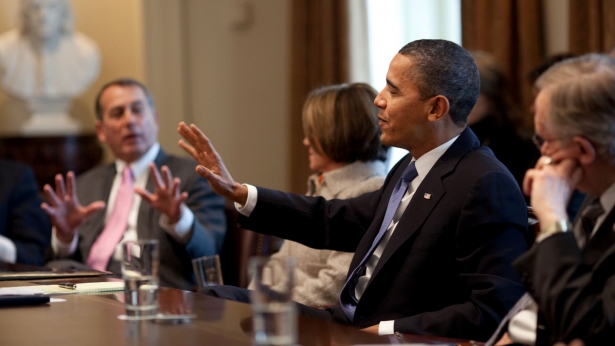The flame war over health care reform has quieted. But it’s still raging on the campaign trail, and occasionally flares up in Washington, too. The most recent contretemps? Republicans are citing an updated Congressional Budget Office report to claim that the new health care law will actually cost over a $100 billion more than originally advertised.
Do Republicans have a point? Where do these “new” costs come from, and why weren’t they included as part of the cost estimate of the bill that passed Congress?
The short answer is Republicans are trying to change the budgeting rules mid-game to boost the cost of health care reform. The long answer is a bit more complicated, but comes down to this: Republicans want to assign to HCR costs Congress may or may not ever actualize–even though budget experts say that’s not how it should be done, and in fact isn’t how it’s usually done. Let me explain.
If the CBO is right, Congress will likely appropriate $115 billion in order for federal agencies to implement and administer the core features of reform–mandates, insurance subsidies, a Medicaid expansion–and to fund new grants and programs envisioned by the law. But this was not included in earlier scores for the simple reasons that it isn’t really in the bill.
The explanation is somewhat technical. The Affordable Care Act mandated new taxes and spending, which are already in the cooker, and will be used to pay for expanding health care, and will come to pass unless Congress passes new legislation reversing (or changing) course. But it also authorizes Congress to raise and spend funds as needed (up to specified levels) mainly for the purposes of jump-starting new programs. Those funds would have to be appropriated in future legislation, and at the discretion of Congress, and the funding levels will ultimately be up to Congress.
Republicans argued all along that these costs should be estimated and counted toward the cost of the legislation. But that’s just not how budgeting works, and the administration is at pains to point out that the GOP is trying to erect new standards for judging the price tag of legislation for political gains.
They have a good argument.
“CBO does not include discretionary spending in its assessment of the effects of legislation on the deficit because it cannot estimate either how much future discretionary funding Congresses will actually appropriate for any program or purpose or how any such appropriations would affect total discretionary spending,” write budget experts Paul Van de Water and James Horney of the Center for Budget and Policy Priorities. “Congress traditionally authorizes spending for many discretionary programs at much higher levels than are actually appropriated; indeed, many authorizations are never funded at all, because the Appropriations Committees cannot find room to fund them within the overall amount they are allowed to appropriate for the year.”
For instance, Congress will pass appropriations legislation to keep the Department of Health and Human Services operating, and will, from that pool of money, decide if, and how generously, to fund these new programs.
That’s not stopping the GOP from saying the “hidden” costs of reform will eat up all of its potential deficit reductions.
“If Congress were to approve all of this new discretionary funding authorized in the health care bill, almost all of the administration’s highly touted savings would be made null and void,” said a spokesperson for House Appropriations Committee Republicans.
But that’s not true either. Even if the programs and administrative costs max out, Congress will still have to respect the White House’s discretionary spending freeze, meaning they’d have to reduce appropriations elsewhere to maintain balance.
Rhetorically, Republicans have the easier argument. And it’s possible that Democrats punted on some of these programs to avoid running over their self-impost cost ceiling. But is this new report unmask unknown Democratic funny business? The answer is “no”.










